This article was medically reviewed by Sarah Gehrke, RN, MS. Sarah Gehrke is a Registered Nurse and Licensed Massage Therapist in Texas. Sarah has over 10 years of experience teaching and practicing phlebotomy and intravenous (IV) therapy using physical, psychological, and emotional support. She received her Massage Therapist License from the Amarillo Massage Therapy Institute in 2008 and a M.S. in Nursing from the University of Phoenix in 2013.
There are 10 references cited in this article, which can be found at the bottom of the page.
This article has been viewed 30,261 times.
While there is no cure for the herpes virus, treatment options are more available than ever. Many people who have herpes will never experience an outbreak. Others will experience very mild outbreaks, and may not even know their symptoms are because of herpes.[1] For those that do experience herpes outbreaks, though, a combination of antiviral prescriptions and self-care can help make outbreaks more comfortable and manageable.
Steps
Recognizing Genital Herpes
-
1Assess your herpes risk. There are lots of viruses in the herpes family, but two strains cause what we think of herpes: HSV-1, or oral herpes, and HSV-2, or genital herpes. Both types of herpes are spread through skin-to-skin contact with the infected area. Typically, genital herpes comes from genital sexual contact with someone who has HSV-2. However, HSV-1 can be spread to the genitals through oral sex. Consider whether you have had any type of intimate contact with another person that could have transmitted herpes.[2]
- Sex does not need to involve penetration for herpes to spread. Any intimate contact including rubbing or grinding genital areas could spread herpes.
-
2Look for herpes symptoms. Many people who get herpes experience no symptoms or outbreaks. When someone does experience symptoms, though, the most common are blisters around the genitals or rectum. These blisters break and create painful sores that can take over a week to heal. Other symptoms of an outbreak may include:[3]
- Fever
- Body aches
- Swollen glands
- Tingling, burning, or itching sensations
- Unusual vaginal discharge
Advertisement -
3Seek a medical diagnosis if you experience symptoms. If you think you are experiencing symptoms of genital herpes, schedule an appointment with your doctor as soon as possible. They will be able to help determine if your symptoms are because of herpes or another complication.[4]
- Not only will your doctor be better equipped to diagnose herpes, they will be able to help you develop a comprehensive management plan.
- Your doctor can take a sample from any sores and in some cases may perform a blood test for herpes antibodies. Note that while a blood test can determine if you’ve been exposed to herpes before, it cannot tell you when you were infected or who gave it to you.[5]
Treating an Outbreak
-
1Get an antiviral prescription from a doctor. Antiviral tablets are the most common and typically the most effective means of managing an HSV outbreak. Schedule an appointment with your doctor as soon as you notice any potential symptoms. Let them know that you think you may be experiencing an outbreak, and that you are interested in a prescription for an antiviral.[6]
- Common prescriptions for herpes include acyclovir, famciclovir, and valacyclovir.[7]
- If you are not comfortable seeking help from your regular doctor, or if you cannot afford a traditional doctor’s office visit, consider visiting a sexual wellness clinic. These clinics specialize in managing sexual health issues, and often have a sliding scale option.
-
2Use a topical cream to reduce discomfort. Acyclovir comes in a topical cream form that you can put on sores during the primary stages of an outbreak. It does not help manage the overall outbreak in the same manner as the antiviral tablets, but it can help treat some of the burning and discomfort.[8]
- Wash your hands before and after applying any topical medication to your sores or cleaning them.
-
3Use an over-the-counter painkiller to manage discomfort. Over-the-counter painkillers like acetaminophen, ibuprofen, and aspirin can be taken to help relieve some pain. Consult the packaging of your preferred pain killer for dosage recommendations and take it as advised by the packaging.[9]
- For teenagers younger than 16, consult your doctor before taking aspirin. There is an increased risk of Reye’s Syndrome.
-
4Apply a cool compress to sores to dull itching and pain. Apply a cool compress to the sore areas once every few hours to help temporarily dull the pain and itching. You can buy a cold compress at most drug stores and pharmacies, or you can make your own.[10]
- To make your own compress, fill a plastic bag with ice. Wrap the bag in a paper towel or thin piece of cloth, and apply it to your skin.
- Apply the compress for no more than 20 minutes at a time, and be sure to give your skin at least 2-3 hours in between compress treatments to avoid frostbite.
-
5Clean your sores to help them heal. Wash your sores gently with soap and warm water during your daily shower, and pat them dry with a clean towel. Do not bandage the sores, but resist the urge to pick at them. Wear loose cotton underwear and clothes to let your sores breathe while they heal.[11]
Managing Dormant Herpes
-
1Get a prescription for an antiviral as suppressive therapy. While some people with genital herpes choose to treat outbreaks as they occur, others choose to pursue continued therapy to help suppress the virus. The same medications used to treat outbreaks can be taken on a daily basis as suppressive therapy, so talk to your doctor about daily medication.[12]
- Suppressive medication is especially helpful if you experience 6 or more outbreaks a year.
- Suppressive therapy does not completely eliminate outbreaks in most cases. However, it may help reduce the overall number of outbreaks and make outbreaks less severe.
-
2Maintain a healthy lifestyle. As with many other illnesses, a strong immune system will help reduce the risk of a herpes outbreak. Help keep your immune system strong by maintaining a healthy lifestyle composed of well-rounded meals and regular exercise.[13]
- Try to eat a daily diet that contains carbohydrates, fats, and proteins. Be sure to incorporate healthy fruits and veggies, and try to eat lean, complete proteins when possible.
- Aim to get at least 20-30 minutes of moderate physical activity 3-4 times a week. If you can get 45-60 minutes at least five times a week, that is even better.
-
3Practice self-care to minimize risks of outbreaks. Self-care helps keep you happy and healthy, which in turn helps reduce the risk of a future outbreak by keeping your immune system strong. Practice regular self-care daily by:[14]
- Getting 7-9 hours of sleep per night.[15]
- Meditating or using stress-management techniques to keep stress low.
- Make time each day to do something you enjoy.
References
- ↑ https://www.cdc.gov/std/herpes/stdfact-herpes-detailed.htm
- ↑ https://www.cdc.gov/std/herpes/stdfact-herpes.htm
- ↑ https://www.cdc.gov/std/herpes/stdfact-herpes.htm
- ↑ https://my.clevelandclinic.org/health/diseases/4248-genital-herpes-hsv-2#diagnosis-and-tests
- ↑ https://www.cdc.gov/std/herpes/stdfact-herpes.htm
- ↑ https://www.cdc.gov/std/herpes/treatment.htm
- ↑ https://www.drugs.com/acyclovir.html
- ↑ https://familydoctor.org/condition/herpes/
- ↑ https://medlineplus.gov/ency/patientinstructions/000653.htm
- ↑ https://medlineplus.gov/ency/patientinstructions/000653.htm
- ↑ https://medlineplus.gov/ency/patientinstructions/000653.htm
- ↑ https://www.cdc.gov/std/treatment-guidelines/herpes.htm
- ↑ https://www.health.harvard.edu/blog/healthy-lifestyle-5-keys-to-a-longer-life-2018070514186
- ↑ https://medlineplus.gov/ency/patientinstructions/000653.htm
- ↑ http://pennstatehershey.adam.com/content.aspx?productId=117&pid=60&gid=000653
About This Article
To treat genital herpes, talk to your doctor so they can prescribe you an antiviral medication to help with outbreaks. They can also prescribe topical medication that can help with the burning and discomfort caused by an outbreak. In addition to taking prescription medications, you can take an over-the-counter pain reliever, like ibuprofen, to help with the pain. Also, gently wash your sores with soap and warm water every day and wear loose cotton underwear to help them heal faster. For more advice from our Medical co-author, like how to recognize genital herpes, read on.


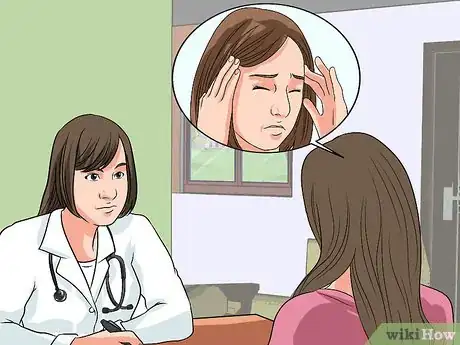
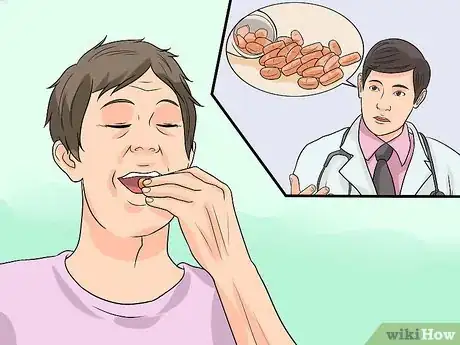
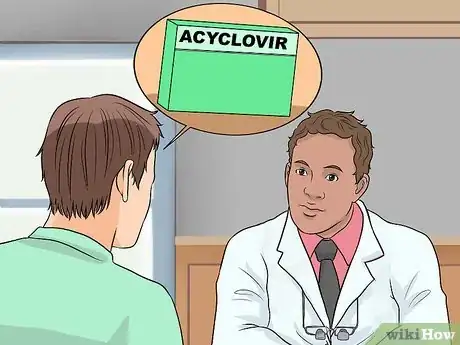
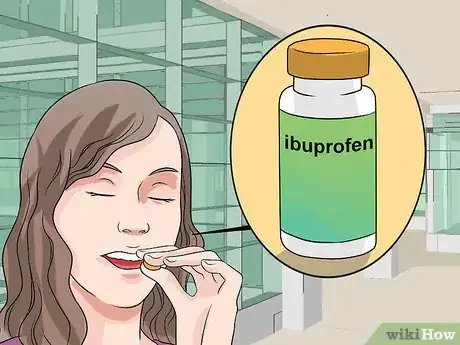
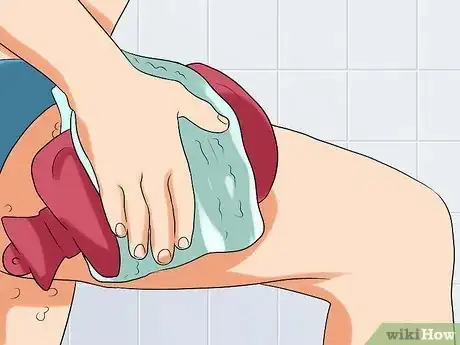
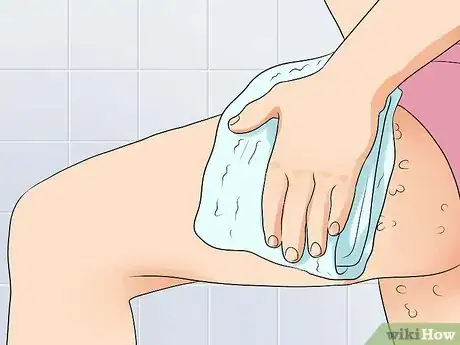
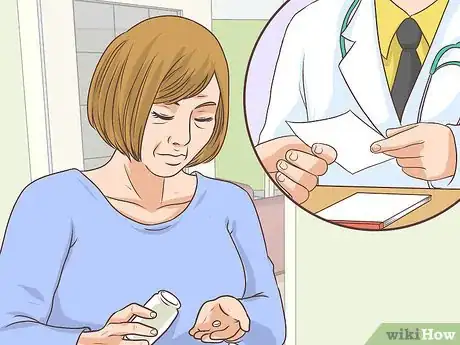


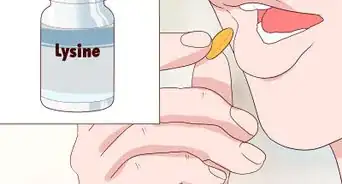


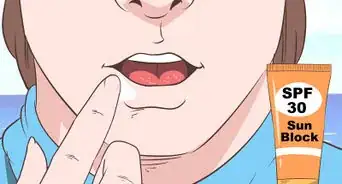
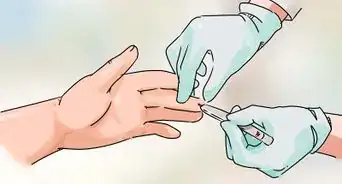
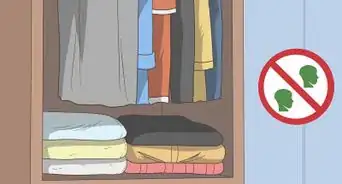



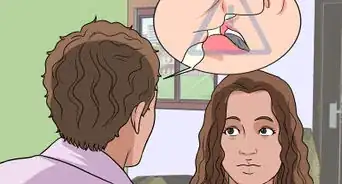
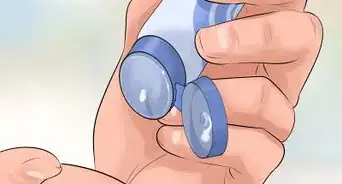
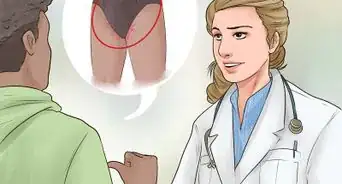







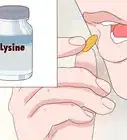


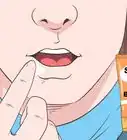



































Medical Disclaimer
The content of this article is not intended to be a substitute for professional medical advice, examination, diagnosis, or treatment. You should always contact your doctor or other qualified healthcare professional before starting, changing, or stopping any kind of health treatment.
Read More...